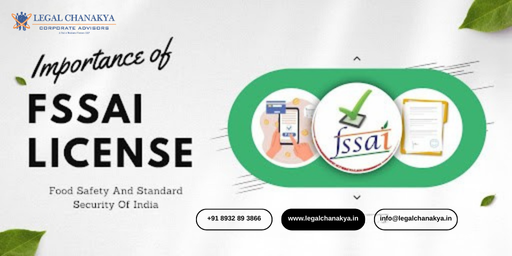Table of Contents
- 1. Introduction: Why FSSAI License Matters
- 2. What is FSSAI and FSSAI License?
- 3.
- 4. Who Needs an FSSAI License?
- 5. Types of FSSAI Licenses
- 6. Documents Required for FSSAI License
- 7. Step-by-Step Process to Apply for FSSAI License
- 8. Validity, Renewal, and Fees Structure
- 9. Post-Registration FSSAI Compliance
- 10. Penalties for Non-Compliance
- 11. Benefits of Having an FSSAI License
- 12. Conclusion
Introduction: Why FSSAI License Matters
In India, food safety and hygiene are not just business practices but legal requirements. Any food business operator (FBO)—whether a restaurant, cloud kitchen, food manufacturer, or trader—must obtain an FSSAI license to operate legally. It ensures consumer trust, food safety, and regulatory compliance.
What is FSSAI and FSSAI License?
The Food Safety and Standards Authority of India (FSSAI) is a statutory body under the Ministry of Health & Family Welfare. It regulates food safety, hygiene, and quality standards across the country.
An FSSAI license (also known as a food license) is mandatory for all food businesses. It certifies that your business complies with the Food Safety and Standards Act, 2006.
Who Needs an FSSAI License?
Any business dealing in food requires an FSSAI license, including:
- Restaurants, cafes, and hotels
- Cloud kitchens and catering services
- Food manufacturers and processors
- Packaged food businesses
- Importers & exporters of food products
- Wholesalers, traders, and transporters
- Online food delivery businesses
Types of FSSAI Licenses
Basic FSSAI Registration
- • For small food businesses with turnover up to ₹12 lakhs per year.)
- • Suitable for small retailers, hawkers, petty manufacturers.
State FSSAI License
- • For medium-sized businesses with turnover between ₹12 lakhs and ₹20 crores.
- • Applicable to restaurants, medium manufacturers, distributors within a state.
Central FSSAI License
- • For large food businesses with turnover above ₹20 crores or operating in multiple states.
- • Mandatory for importers, exporters, large manufacturers, central government agencies.
Documents Required for FSSAI License
- Passport-sized photographs of the applicant
- Identity and address proof (Aadhar, PAN, Passport, Voter ID)
- Proof of business premises (Ownership documents)
- List of food products to be handled/manufactured
- NOC from local municipality or panchayat
- Incorporation certificate/partnership deed (for companies/firms)
- Food safety management plan
- Import Export Code (for food import/export)
- Additional documents depending on type of license
Important: All documents should be self-attested and in PDF format. Ensure document clarity and completeness to avoid rejection.
Step-by-Step Process to Apply for FSSAI License
Determine eligibility
Identify the type of license based on turnover and business size.
Fill Part-A Form
Prepare all mandatory documents.
Apply online
File the application on the FoSCoS portal (Food Safety Compliance System).
Submit fee & documents
Pay applicable government fees and upload documents.
Inspection (if applicable)
Food safety officer may visit premises.
Approval & issuance
On successful verification, license is granted (valid for 1–5 years).
Validity, Renewal, and Fees Structure
Fees Structure (Fees depend on license type:)
Validity and Renewal
Post-Registration FSSAI Compliance
- Display FSSAI license number on food packages and premises
- Maintain proper hygiene and sanitation.
- Conduct regular food safety audits.
- File annual returns (for manufacturers and importers).
- Report changes in business activities to FSSAI.
Penalties for Non-Compliance
Running a food business without an FSSAI license: Up to ₹5 lakhs fine + imprisonment.
Substandard or misbranded food: ₹3 lakhs fine.
False advertising: ₹10 lakhs fine.
Food adulteration: ₹10 lakhs fine and imprisonment.
Benefits of Having an FSSAI License
- Builds consumer trust & credibility
- Ensures legal compliance and avoids penalties
- Enhances food quality assurance
- Helps in business expansion and funding
- Mandatory for export/import of food products
- Listing on food delivery platforms like Swiggy/Zomato requires it
- Online food delivery businesses
Conclusion
The FSSAI license is not just a legal formality—it’s a mark of trust and safety. Whether you run a small bakery, a cloud kitchen, or a large-scale manufacturing unit, obtaining the right FSSAI license is essential for smooth operations. By staying compliant, you not only safeguard your business but also win customer confidence.
For hassle-free FSSAI registration and compliance, connect with Legal Chanakya – your trusted partner in business legal solutions.
Need Professional Help with GST Registration?
Our expert CA team can handle your complete GST registration process with 100% accuracy and compliance.


